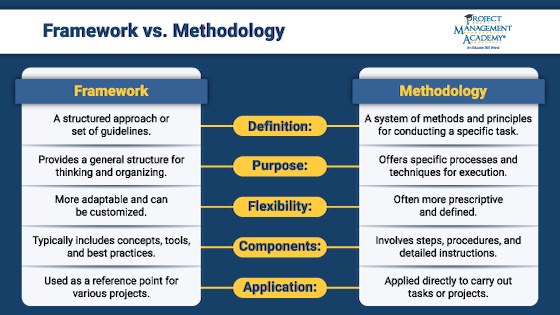The project manager plays a critical role in making the selection of what project management approach to apply to a project. Their ability to choose the right approach can significantly impact the project’s success. Therefore, they need to know the difference between project management frameworks and methodologies.
What is Project Management
The Project Management Institute (PMI®) provides global standards and best practices for project management. PMI defines project management as “the application of knowledge, skills, tools, and techniques to project activities to meet project requirements.” A project manager should know what a framework provides and how to select the methodology to enable the project team to meet project goals.
Project Management Methodologies and Frameworks | What to Consider
Project management frameworks and methodologies speak to how projects are planned, organized, and executed. A Project Manager should consider the project’s scope, complexity, and needed flexibility as part of determining if a framework, methodology, or both, are needed. If the project has a broader scope with documentation requirements, the project manager should use a project methodology to manage work; if the project has a smaller scope that also needs some flexibility to develop iterations of the deliverables, the project manager should use a framework.
Project Management Framework vs Project Management Methodology
While some use framework and methodology interchangeably, a good project manager knows the difference between the two and how to pick what will best ensure success for the type of project at hand. You may need a framework, a methodology, or both. Consider these examples of connected frameworks and methodologies:
- Predictive Project Management Framework and Waterfall Methodology.
- Adaptive Project Management Framework and Agile Project Methodology.
- Hybrid Project Management and Lean Methodology.
The project manager needs to understand the project’s complexity, documentation needs, and flexibility to make the most effective selection of what to use among framework, methodology, or methology and framework.

Project Management Framework
Frameworks, such as Predictive or Adaptive, are designed to adapt to the evolving needs of a project. They are particularly effective for projects that require a flexible management approach and are not heavily reliant on detailed documentation from the outset.
What is a Project Management Framework
A generalized set of principles that help project managers determine how to manage the project to best ensure success. On the other hand, a methodology is a detailed system of practices, techniques, procedures, and rules used within a framework.
When to UseProject Management Framework
Use a framework when you need structure balanced with flexibility. A framework is likely the best choice when you know your project will need to have these components:
- adaptability to specific project needs throughout the project,
- changing requirements informed by the evolution of the project, and
- frequent stakeholder input with active collaboration.
Software development and other innovative project types do best with a framework.
Examples of Project Management Framework
Generally speaking, there are three project mangement frameworks. A project manager can chose to use a framework by itself or use a combination of methology and framework.
- Predictive Project Management progresses the project work through a sequence of sequential phases. Each phase must be fully completed before work in the following phase may begin, and each phase must be completed in order. For this reason, predictive (also called “traditional”) is ideal for projects with known and locked requirements.
- Adaptive Project Management is an iterative and incremental approach. When successfully applied, it can foster the ideal environment for the team to quickly adapt to project changes. If Project deliverables are likely to evolve as the project continues, it is ideal for projects that need more innovation and less documentation.
- Hybrid Project Management uses a combination of predictive and adaptive traits, but not always in the same way. Frequently for hybrid, a project manager creates a traditional project plan and within it, incorproates iterative development cycles to catpure stakeholder feedback.
Project Management Methodology
Project management methodologies are prescriptive approaches within a framework utilizing specific processes and tools.

The Project Manager Benefits of Earning a PMP® Certification
Discover the many benefits of earning your Project Management Professional (PMP)® certification.
What is Project Management Methodology
The detailed processes, steps, and best practices used within a framework. PMI defines a methodology as a “…system of practices, techniques, procedures, and rules used by those who work in a discipline.”
When to UseProject Management Methodologies:
Use a project management methodology when tight control and reliable consistency are needed. A project methodology is commonly employed when the project has:
- a complex and large scope,
- a need for detailed documentation, and
- a requirement of repeatable processes.
A methodology is used most commonly for infrastructure development or regulatory-driven projects. Remember, a project manager may choose to use only a methodology or, depending on the project needs, use a methodology and a framework.
Examples of Project Management Methodology
Examples include:
- Waterfall | detailed sequential project plan with approval gates as part of the project phases: Initiation, Planning, Execution, Monitoring and control, then Closure.
- Agile Project | iterative and collaborative project plan with work sprints with origins based on the 2001 Agile Manifesto written by a group of software developers that states:
- Individuals and interactions over processes and tools
- Working software over comprehensive documentation
- Customer collaboration over contract negotiation
- Responding to change over following a plan
- Lean | drives continuous improvement by eliminating waste
How to Choose Between Methodology and Framework
Gain an understanding of the project team size, project timeline, resource availability, stakeholder involvement, project scope, and need for project flexibility to inform your selection of framework and methodology. To get started, use these questions to help you determine if you need a framework, methodology, or both.
- What is the project’s complexity?
- If the project needs flexibility, use a framework.
- If the project needs structure, use a methodology.
- What are the stakeholder expectations?
- If there is a requirement for ongoing collaboration and feedback loops, a flexible framework is ideal.
- If there is a requirement for formal, detailed documentation, a structured methodology is a good fit.
- How much flexibility does the project need?
- If project requirements are expected to evolve as the project progresses, employ an adaptive framework.
- If project requirements are known and changes are discouraged throughout the project, use a predictable framework and methodology.
- What are project team dynamics?
- If the team is new to the Adaptive project framework, it may take time to adjust to it.
- If the team is experienced in the predictive framework, then the waterfall methodology will be easier to apply.
Selecting a Project Management Framework or Methodology for Success
Project management is most effective when there is alignment across project goals, the type of project, and selection of project management approach. The approach can be a framework, a methodology, or both. To support your efforts to select the approach, keep these points in mind:
(1) Frameworks offer guidelines without being overly prescriptive. They are a flexible project management approach.
2) Methodologies provide a set of clearly defined processes for managing tasks and deliverables. They are a structured and prescriptive project management approach.
Complete a careful evaluation of your project’s needs, complexity, and stakeholder expectations, to help you choose the right approach for project execution with more reliable project outcomes.


 New Horizons
New Horizons
 Project Management Academy
Project Management Academy
 Six Sigma Online
Six Sigma Online
 TCM Security
TCM Security
 TRACOM
TRACOM
 Velopi
Velopi
 Watermark Learning
Watermark Learning
 Login
Login




 New Horizons
New Horizons
 Project Management Academy
Project Management Academy
 Velopi
Velopi
 Six Sigma Online
Six Sigma Online
 TCM Security
TCM Security
 TRACOM
TRACOM
 Watermark Learning
Watermark Learning